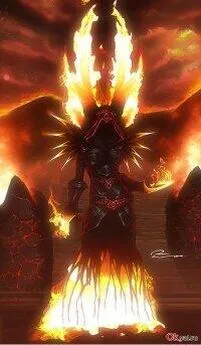The Warlock in Spite of Himself
- Название:The Warlock in Spite of Himself
- Автор:
- Жанр:
- Издательство:неизвестно
- Год:неизвестен
- ISBN:нет данных
- Рейтинг:
- Избранное:Добавить в избранное
-
Отзывы:
-
Ваша оценка:
The Warlock in Spite of Himself краткое содержание
The Warlock in Spite of Himself - читать онлайн бесплатно полную версию (весь текст целиком)
Интервал:
Закладка:
Big Tom and his wench lay still, eyes fixed on the door.
Rod grunted and levered himself to his feet. "Don't worry," he growled. "Ghosts don't knock."
"Ho, minstrel!" a gruff beery voice bellowed. "Come forth to my master!"
Rod struggled into his doublet and caught up his harp. He swung open the great oak door, shaking his head to clear the traces of his meager sleep. "You might at least try to be civil at this hour of the damn morning," he growled. "And just who the hell is your master?"
The heavy fist caught him under the ear, sent him sprawling against the wall. He fought down the instant impulse to break the man's neck.
Through a ringing, blurred haze he heard a deep, sadistic chuckle. "Mind how you speak to your betters, gleeman. Tis a good rule for a peasant."
Rod gathered himself, hands braced against the wall, and sized up his persecutor. It was a common foot soldier in leather and mail, both of which needed cleaning, as did the soldier himself. He might have been a commoner, but he had an uncommon case of B .O., and halitosis on top if it, possibly due to the rotting teeth he was exhibiting in a self-satisfied grin.
Rod sighed and straightened, deciding it might be better to play his part; in fact, he'd deserved the blow, for having dropped out of character. The jester in medieval society served as an emotional release, not only through entertainment, but also through providing an outlet for aggressions by becoming their object.
"All right," he said, "I'm schooled. Let's go."
The fist caught him beneath the jaw this time. As he rolled with the blow, he heard the gleeful voice growl, "Thou'rt not schooled enough. To address your betters with master is the rule."
Rod fought the anger down into a cold, calm, cal-culating rage and lunged, his hands chopping out in three quick blows.
"I've got a better rule for a soldier," he informed the crumpled heap at his feet. "First be sure who your betters are. Now take me to your master."
The master, as it turned out, was Loguire. Rod was ushered into a medium-sized room, high-ceilinged and hung with tapestries. Three tall, narrow windows, through which Rod saw sunlight, dawn-colored, broken by the shifting prism of the waterfall. The room was filled with its roaring. But the sound was muted; looking closer, Rod saw the windows were double-paned, and three feet deep. Somebody had remembered some of the old technology.
The walls were hung with tapestries; there was a heavy carpet underfoot. A great oval table took up the center of the chamber. At its head sat Loguire; at his right, his eldest son. Durer sat at his left. The other places were taken up by eight men who had a familiar look. Rod's eyes widened as he recognized them: the Duke Di Medici, the Earl of Romanoff, the Duke Bourbon, and the Prince Hapsburg, and their councillors.
After Loguire, they were the four most powerful of the Great Lords. And if these five were gathered together, might not the other seven be close by?
All were at breakfast, but none of them really seemed to realize they were eating. Take Anselm, there, Loguire's son—he ate like a machine, glaring at his plate, face set like a sculpture of cold fury.
His father sat with head bowed, hands pressed tight to the table before him.
At a guess, Rod decided, there had been a bit of a quarrel here, between father and son, and Loguire had won—but only by ordering his son to shut up.
And Rod had been called in to heal the breach. Oy! The things people expect of performers!
Durer's face was lit with a subterranean glow of vindictive joy; the other councillors had milder versions of the same look. Whatever had happened here had gone the way Durer wanted; in fact, he'd probably instigated it. The man was the perfect catalyst, Rod decided: he never got involved in the reactions he caused.
Loguire looked up at his son, mute appeal in the old, red-rimmed eyes. But Anselm gave him not so much as a glance, and Loguire's face firmed into flint.
Turning, the old man saw Rod. "Minstrel!" he barked. "Why stand you there idle? Give us merriment!"
Durer's head snapped around, his eyes locked on Rod. Alarm chased shock across his face, to be followed by distilled, murderous hate.
Rod smiled cheerfully, bowed, and touched his forelock in salute. Inwardly, he wondered what song could possibly burn away the tensions in this room. He strongly suspected the custom was to clear the air by beating^the minstrel for failing to fulfill his assignment.
He began to play "Matty Groves," figuring his only chance lay in giving them something more gruesome than anything that could possibly have just taken place.
He held off on the words for a few minutes, though, to give him time to study the faces of the four lords. Their looks ranged from ruminative speculation to outright (though veiled) contempt, the last apparently directed at the old Duke. It would seem that Loguire had no virulent supporters here; the balance of opinion seemed to rest with his son.
"Minstrel!"
Rod looked up; it was Anselm who had spoken.
The young man's face seemed to have soured so much it had curdled. "Have you a song for a lad made a fool by a woman, yet doubly a fool, still, to love her?"
"Ha' done!" Loguire snapped; but before Anselm could reply, Rod said, "Many, my lord, of a man still loving a woman who scored him; and in all of them, the lady comes back to him."
"Comes back! "Anselm spat. "Aye, she'd take him back—to hang him in shame at her castle gate!"
The old Duke drew himself to his feet, roaring, "Enough of your slander!"
"Slander!" Anselm's chair crashed over as he rose to meet his father. "And is it slander to say she has spit on the proud name of Loguire, aye, and not once but twice, and will do so again?"
"Nay!" He slammed his fist on the board, turning to rake the lords with his glare. "This vile wench shall learn that she dare not trample the honor of her peers! We must tear her from the seat of power and break her beneath us for ever and aye!"
Loguire's face reddened, his throat swelled with a rebuke; but before he could speak it, Rod murmured, "Nay, my lord, not so harsh. Not a defeat, but a discipline."
He was caught in a crossfire of laser-beam glares from Anselm and Durer; but Loguire boomed "Aye!" with a giant's joy and relief. "He speaks out of place, but his speaking is true! Our young Queen is headstrong; but so is a filly before it is bridled. She must learn her authority is not absolute, that there are checks upon her power; but she is the sovereign, and must not be torn down!"
Anselm made a gurgling sound, his face swollen red and his eyes starting forth from their sockets, choking with rage; then he managed to speak, fairly stuttering in his wrath.
"Nay, now! Now I say nay! A woman for a sovereign? Tis a mockery! And a whoring, arrogant bitch of a—"
"Be still!" Loguire thundered, and even the four great lords shrank away from the savage power of his voice.
As for Anselm, he fairly cowered, staring appalled at the white-bearded giant before him, who almost seemed to swell and tower high as they watched.
Then, slowly, and with greater dignity than Rod had ever seen in a man, the true regal dignity that only comes unaware, Loguire resumed his seat, never taking his eyes from his son. "Retire to your chambers," he said in a cold, still voice. "We shall speak no more of this till the conclave at sunset."
Anselm somehow managed to summon the strength to lift his chin again, a gesture that somehow seemed pompous and ridiculous, and turned on his heel. As he stalked to the door, his eyes fell on Rod. Rage and humiliation boiled up in him, and he swung up his arm to favor the minstrel with a back-handed slap.
"Nay!" barked Loguire, and Anselm froze.
"This man," said the Duke, speaking in centimeters, "has spoken truth. I will not have him maltreated."
Anselm locked glares with his father; then his look faltered, and dropped. He turned away; the door slammed behind him.
"Minstrel," rumbled Loguire, "play!"
Rod let his fingers ramble through "The Old Man of TorTappan" while he reflected.
So there would be a council of war tonight, eh? And the main issue would apparently be constitutional monarchy versus warlordism, though only he and Durer might know it. Well, he knew which side he was on.
He looked again at the straight-backed old Duke, eating token bits of food, lips pressed tight under his flowing white beard, brow locked in a slight scowl, only the slightest hint of his grief showing in the deep, shadowed eyes.
Yes, Rod knew which side he was on.
They met in the great hall, large enough to act as a hangar for a good-sized spaceship, if the Gramarians had known what a spaceship was.
The stone floor was inlaid with Loguire's coat of arms. Great silver sconces supported torches every yard or so along the walls. The ceiling was concave and gilded, with an immense silver chandelier suspended from its center. There were no windows; but that made little difference, since night had fallen.
Loguire sat in a great carved chair at one end of the hall, bunting of his family's colors draped on the wall behind him. His chair was raised on a four foot dais, so that the standing lords must look up at him.
There were a good many of them, not only the twelve greats, but with them a host of counts, barons, and knights, their vassals.
And at each one's elbow stood, or rather hunched, a thin-faced, bony little man, with scant light hair lying close against his scalp.
Rod surveyed the hall; his lips pursed into a soundless whistle. He hadn't realized the councillors were so numerous. There were at least fifty, maybe seventy.
And there might be more outside his field of view. At the moment, he had literal tunnel-vision, and one-eyed at that. The torches that illuminated the hall sat in sconces that were held to the wall with three rough bolts.
But one of the sconces behind Loguire's throne was missing a bolt, and the stone behind it was bored through for an inch, then hollowed out to the depth and width of a man's head. The head, at the moment, was Rod's, where he stood in the clammy darkness of a narrow passage behind the wall.
His peephole afford him an excellent view of the back of Loguire's head, and some nice over-the-shoulder shots of anyone addressing him.
His right hand rested on a lever; if he pushed it down—if it wasn't rusted tight—the stone before him should swing wide to make a handy door. From the looks on the faces of the lords confronting the Duke, it might be very handy.
The man immediately in front of the Duke was An-selm. Bourbon and Di Medici stood at either side of the young man. Durer, of course, stood at Loguire's left hand.
Loguire rose heavily. "We are met," he rumbled. "Here in this room is gathered all the noble blood of Gramarye, the true power of the land." He scanned the faces before him slowly, looking each of his brother Great Lords directly in the eye.
"We are met," he said again," to decide on a fitting rebuke for Catharine the Queen."
The Duke of Bourbon stirred, unfolding his arms and setting his feet a little further apart. He was a great black bear of a man, with shaggy brows and a heap of beard on his chest.
His fists clenched, his mouth tightened. There was something furtive, sheepish, in his stance.
He glared at Loguire. "Nay, good Uncle, you have the wrong of it. We are met to say how we may pull her down, she who would trample upon the honor and the power of our nobles Houses."
Loguire stiffened, his eyes widening in outrage. "Nay!" he choked," there is not cause enough…"
"Cause!" Bourbon straightened, his black beard jumping with his jaw. "She hath taxed our lands more heavily than ever in the traditions of our lore, and wasted the substance upon the filth and dirt of peasants; she sends her judge amongst us every month to hear complaints from all the manor; and now she will appoint her priests within our lands—and we have no cause? She robs us of our rightful rule within our own demesnes, and then upon this all insults us to our faces by hearing the petitions of besotted beggars ere she will bend her ear to ours!"
Читать дальшеИнтервал:
Закладка:





![Джеймс Купер - Пионеры, или У истоков Саскуиханны [The Pioneers, or The sources of the Susquehannah]](/books/1066142/dzhejms-kuper-pionery-ili-u-istokov-saskuihanny-t.webp)



